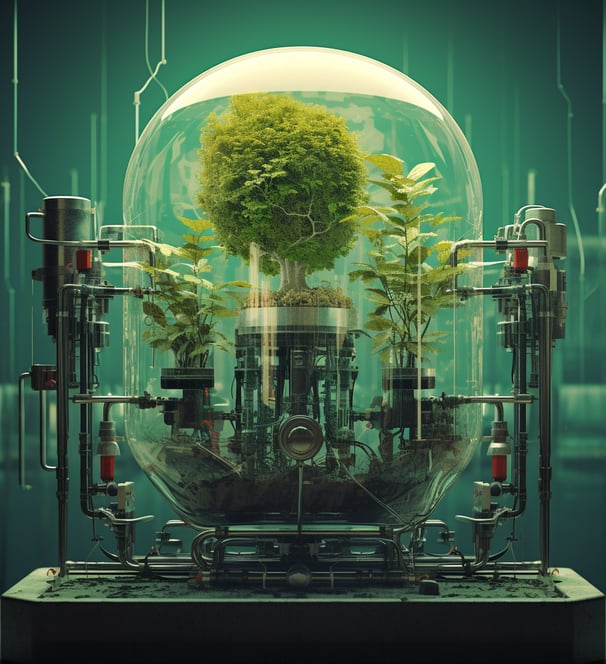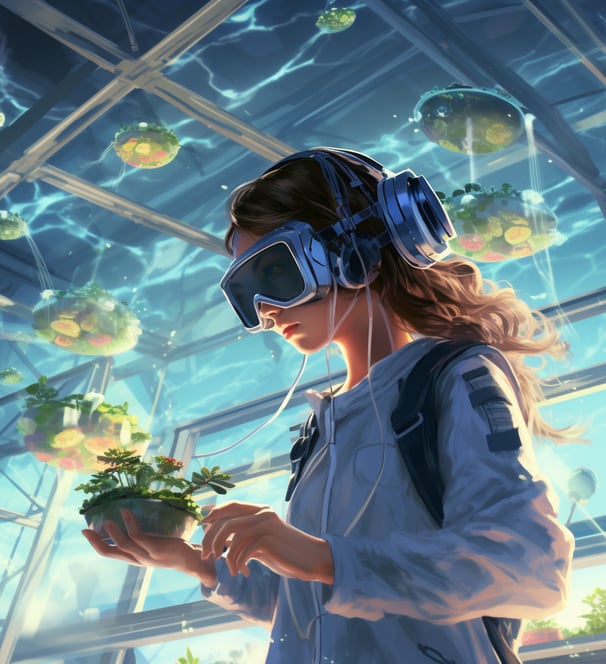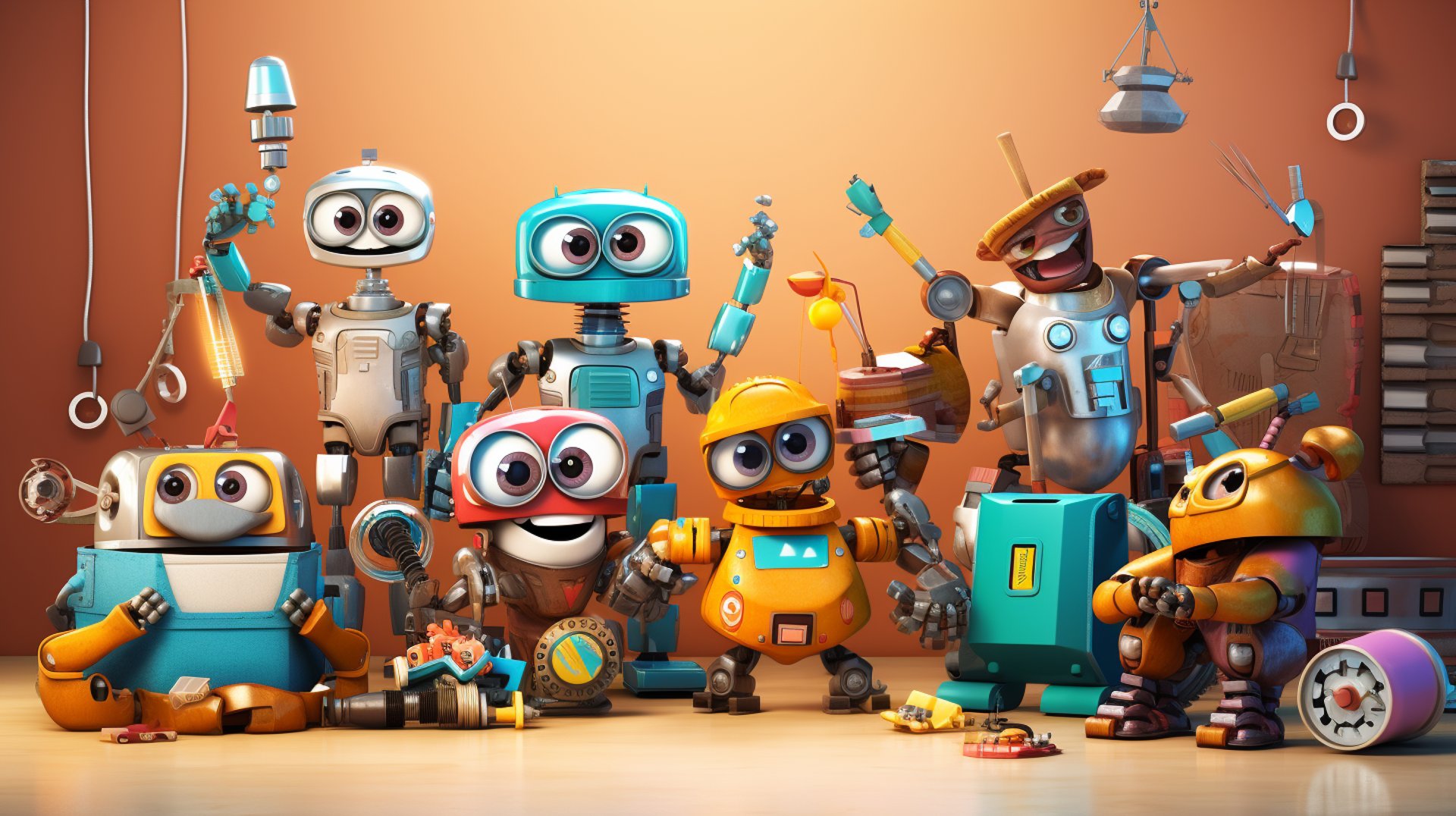

AI: Revolutionizing the Economic Engine - Efficiency, Growth, and New Horizons
The gears of the global economy are experiencing a historic shift. Artificial intelligence (AI) is no longer a futuristic concept; it's rapidly integrating into various economic processes, transforming traditional methods and paving the way for a more efficient, data-driven future.
Explore the Future of IT


AI's Impact: A Numbers Game
Let's start with the cold, hard facts. A McKinsey Global Institute report estimates that AI could contribute up to $15.7 trillion to global GDP by 2030, primarily through increased productivity and innovation. This translates to a potential boost of up to 2.6 percentage points in annual growth.
From Automation to Optimization: How AI is Reshaping the Economy
AI's impact goes beyond replacing human workers in specific tasks (although automation plays a role). Here are some key ways AI is driving economic change:
Enhanced Efficiency: AI-powered algorithms can analyze vast amounts of data, optimize business operations, and streamline decision-making. Imagine a logistics company using AI to predict demand and optimize delivery routes, saving time and money.
Personalized Experiences: AI allows businesses to tailor their offerings to individual consumers. E-commerce giants leverage AI to recommend products, leading to increased customer satisfaction and sales.
Risk Management and Fraud Detection: Financial institutions are utilizing AI to analyze financial data and predict financial risk, ensuring a more stable and secure financial ecosystem. For instance, AI can detect fraudulent transactions in real-time, protecting consumers and businesses.
Innovation and Job Creation: AI acts as a catalyst for innovation, creating new products, services, and entire industries. For example, AI-powered medical diagnostics can revolutionize healthcare, leading to new jobs in development and maintenance of these technologies.
Case Study Spotlight: AI in Action
JD.com, a Chinese e-commerce giant, uses AI-powered chatbots to handle customer inquiries, freeing up human representatives for more complex issues. This has resulted in a 20% reduction in customer service costs and increased customer satisfaction.
The Future of Work: Balancing Innovation with Human Capital
While AI promises significant economic benefits, concerns regarding job displacement due to automation remain valid. The key lies in a complementary approach. AI will take over repetitive tasks, allowing humans to focus on higher-order thinking, creativity, and social interaction.
Conclusion: Embracing the AI Economy
AI is not a replacement for human ingenuity; it's a powerful tool for boosting economic growth and creating new opportunities. By investing in education and skills training, individuals and economies can adapt and thrive in the AI-powered future. Botaty.net, at the forefront of AI and economic insights, will continue to explore these developments and their impact on various sectors. Stay tuned for further updates!
Let the discussion begin! Share your thoughts on AI and its economic impact in the comments below.
Act as a content writer for the website Botany.net. Write a detailed blog post focusing on the intersection of the economy and AI processes. Include reputable sources to support your arguments and provide credibility to the content. Explore how AI is impacting the economy and reshaping industries. Discuss the potential benefits and challenges of integrating AI into various sectors. Ensure that the content is well-researched, informative, and engaging for the readers interested in both economics and technology. with sources
Show drafts
The AI Economy Blooms: How Artificial Intelligence is Reshaping Industries
The world of economics is undergoing a digital metamorphosis, and artificial intelligence (AI) is at the heart of this transformation. No longer a futuristic fantasy, AI is rapidly integrating into the economic landscape, reshaping industries, and driving growth. But what does this mean for the future of our economy? Let's delve into the fascinating intersection of AI and economic processes, exploring both the potential benefits and challenges that lie ahead.
AI's Economic Engine: Powering Growth and Efficiency
The impact of AI goes beyond mere science fiction. A 2020 report by the McKinsey Global Institute estimates that by 2030, AI could contribute a staggering $15.7 trillion to global GDP, primarily through increased productivity and innovation. This translates to a potential annual growth boost of up to 2.6 percentage points (McKinsey Global Institute, 2020).
AI's economic influence manifests in several key ways:
Enhanced Efficiency: AI algorithms can crunch vast datasets, optimize business operations, and streamline decision-making. Imagine a manufacturing plant leveraging AI to predict equipment failures and schedule preventive maintenance, minimizing downtime and maximizing production (PwC, 2020).
Personalized Experiences: AI allows businesses to tailor offerings to individual consumers. E-commerce giants like Amazon utilize AI to recommend products based on past purchases and browsing history, leading to increased customer satisfaction and sales (Harvard Business Review, 2018).
Risk Management and Fraud Detection: Financial institutions are turning to AI to analyze financial data and predict financial risk, ensuring a more stable and secure financial ecosystem. For instance, AI can detect fraudulent transactions in real-time, protecting consumers and businesses (World Economic Forum, 2020).
Innovation and Job Creation: AI acts as a catalyst for innovation, creating entirely new products, services, and industries. For example, AI-powered medical diagnostics hold the potential to revolutionize healthcare, leading to new jobs in development and maintenance of these technologies (McKinsey Global Institute, 2020).
Case Study: AI in Bloom - The Agricultural Revolution
Agriculture, a cornerstone of the global economy, is also experiencing the transformative touch of AI. Startups like Indigo Agriculture utilize AI to analyze soil conditions and weather patterns, providing farmers with data-driven insights to optimize fertilizer use and crop yields. This not only boosts agricultural productivity but also fosters environmental sustainability (Indigo Agriculture, 2024).
Navigating the Maze: Potential Challenges and Considerations
While the potential benefits of AI are undeniable, certain challenges remain:
Job Displacement: Automation powered by AI has the potential to displace certain jobs. The key lies in reskilling and upskilling the workforce to adapt to the changing landscape (World Economic Forum, 2020).
Bias and Inequality: AI algorithms are trained on existing data, which may contain inherent biases. This can perpetuate societal inequalities if not addressed (Brookings Institution, 2020).
Ethical Considerations: As AI becomes more sophisticated, ethical concerns arise regarding data privacy and algorithmic decision-making. Robust regulations are crucial to ensure responsible AI development and deployment (World Economic Forum, 2020).
Conclusion: Cultivating a Sustainable AI Economy
The integration of AI into the economy presents both exciting opportunities and significant challenges. By harnessing the power of AI responsibly, we can cultivate a future of economic growth, innovation, and shared prosperity. Here at Botany.net, we remain committed to exploring the intersections of technology and economics, providing insights and fostering discussions around building a sustainable AI-powered economy. We invite you to join the conversation – share your thoughts on AI and its impact on the economic landscape in the comments below!
Sources:
McKinsey Global Institute: "A landmark study of AI's potential economic impact" (2020): https://www.mckinsey.com/mgi/our-research/generative-ai-and-the-future-of-work-in-america
PwC: "AI in 2030: How artificial intelligence will reshape the world" (2020): https://www.pwc.com/gx/en/issues/artificial-intelligence.html
Harvard Business Review: "The personalization paradox" (2018): https://hbr.org/2001/04/personalization-no-thanks
World Economic Forum: "Artificial intelligence in finance: from hype to reality" (2020): https://www3.weforum.org/docs/WEF_Forging_New_Pathways_2020.pdf
Indigo Agriculture: https://www.indigoag.com/
Brookings Institution: "AI and the future of work" (2020):
Explore the Future of IT











